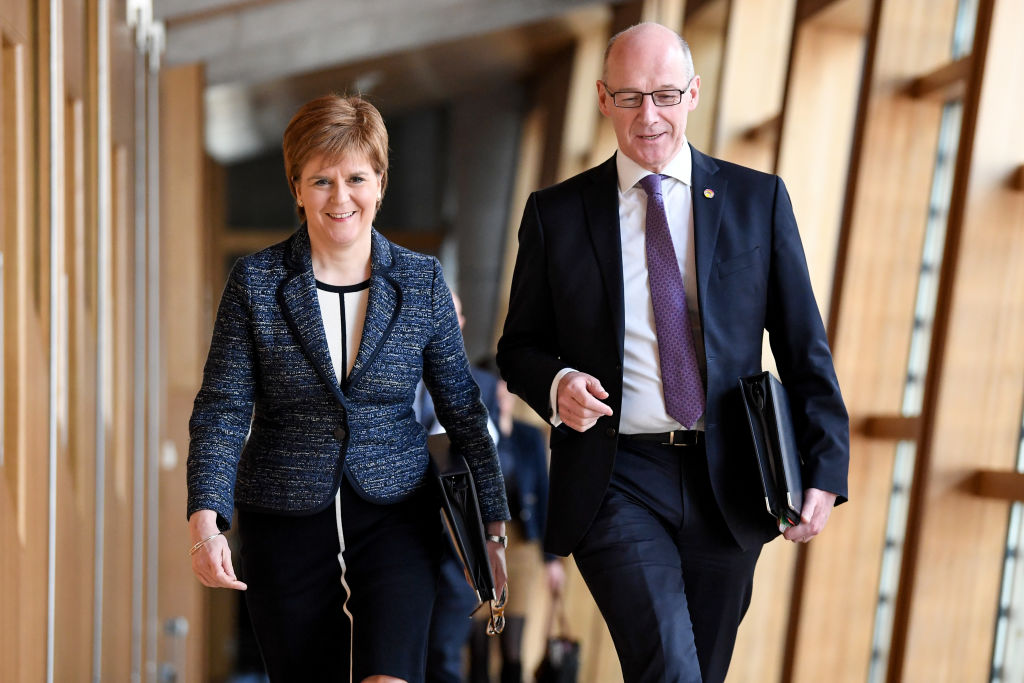Two self delusions have sustained the SNP through the past couple of decades of devolution. The first is the perennial grievance that deteriorating public services are the result of Westminster austerity. The second is that Scotland’s social problems can be solved through redistribution – by taxing the rich. Both have now collapsed in the face of harsh reality.
Low-growth Scotland generates less wealth each year, there are precious free rich left to tax and the public sector remains utterly dependent on financial life-support from the UK exchequer. This is an economy of almost colonial dependency, far removed from the image of independence propaganda.
Deputy first minister John Swinney’s latest Scottish Budget remains very firmly in the land of delusion. Once again income tax increases are to coincide with deep cuts to Scotland’s unprotected public services, like education and local government. This is even though Scotland has been compensated in full, through the Barnett Formula, for the effects of the recent inflation spike.
The block grant continues to provide a morally unjustifiable spending premium: 26 per cent more per head than in England or around £2,300 for each and every Scottish citizen. This subsidy should have been phased out years ago as Holyrood assumed control of the major progressive taxes, including income tax. It hasn’t. The latest Scottish funding award from Westminster is, in real terms, the biggest in history (excluding the Covid years) as economists at the independent Fraser of Allander Institute pointed out earlier this week.
Yet Swinney yesterday recycled the line that ‘Tory austerity’ had caused the deterioration in public service provision, most notably in the NHS. Westminster is also blamed for the persistence of low pay and poverty despite twenty years of Holyrood politicians promising to eradicate it.
What the SNP government don’t realise is that by continuing to rely on financial transfers from London they are undermining their own case for independence.
The delusion extends to the financing of public sector pay deals — which have been significantly higher than in England at around 6 per cent. This will result in cuts elsewhere, to local government and other services, because it breaches the 2 per cent cap in the Scottish government’s own spending review earlier this year.
It’s never enough though. The Scottish Trades Union Congress’s (STUC) general Secretary Roz Foyer, one of Nicola Sturgeon’s best political friends, has called on the Scottish government to ‘tax the wealthy’ in order to pay for further public sector pay rises and welfare benefits. Sturgeon has encouraged this mentality with her own rhetoric about Nordic levels of social protection.
The Scottish government has responded by increasing the higher rate of income tax by 1p to 42p — and again freezing the threshold at which higher rate tax hits home. Scotland’s middle classes were already the highest taxed in the UK. Now someone earning £50,000 will pay £1,550 more than if they were living in England.
That those with the broadest shoulders should carry the heaviest burden is the guiding principle of taxation in all democratic societies. Yet this assumes that broad shoulders exist. In Scotland, increasingly they don’t. The devastating assessment from the Institute for Fiscal Studies is that the Scottish government’s tax increase will yield a grand total of £95 million – enough to run the Scottish NHS for all of 48 hours. The inconvenient truth is that the sclerotic Scottish economy is not generating enough middle class jobs. Swinney is increasingly taxing a chimera.
Here is the sobering fiscal reality. 43 per cent of Scots pay no tax at all and rely increasingly on benefits. Of the 2.5 million that do pay tax the vast majority are on the starter and basic rate. According to Fraser of Allander, only 15,000 Scots have been paying the top ‘additional’ rate, for those earning above £125,000, and 362,000 the higher rate. Yet these two groups, 16 per cent of Scottish taxpayers, have been contributing 60 per cent of tax receipts. This astonishing figure shatters the myth that the rich can always pay more.
In SNP Scotland, not only are there not enough rich people, there are precious few on middle class incomes able to contribute to Nordic level tax rates. Dragging more middle earners into higher tax brackets through successive budgets has generated proportionately less revenue each year. Many of the public sector workers out on the picket lines this week will shortly find that they are now the ‘rich’. The higher rate starts at £43,000: a figure earned by train drivers, many teachers and police constables.
Scotland is in an economic downwards spiral with low incomes, dwindling tax revenues and threadbare public services. This may gladden the hearts of Sturgeon’s Green coalition partners who want to halt growth altogether, but it is a reckless way to manage a modern economy. As job opportunities evaporate and taxes rise, even more Scots will take their professional qualifications and businesses south or abroad.
The root cause of this malaise is the wretched Barnett Formula. So long as this anachronistic and paternalist subsidy continues there will be no incentive for Scottish politicians to prioritise economic growth. It will always be easier to blame Westminster, while making spending promises that can’t be delivered.
What the SNP government appear not to realise is that by continuing to rely on financial transfers from London they are undermining their own case for independence. This will become clear if, or when, there is an independence campaign: Scottish voters will soon observe the belt-tightening required to meet Scotland’s 8 per cent spending deficit. Perhaps that is why Swinney announced yesterday that the Scottish government will no longer be allocating £20 million in civil service resources to make the case for it.







Comments